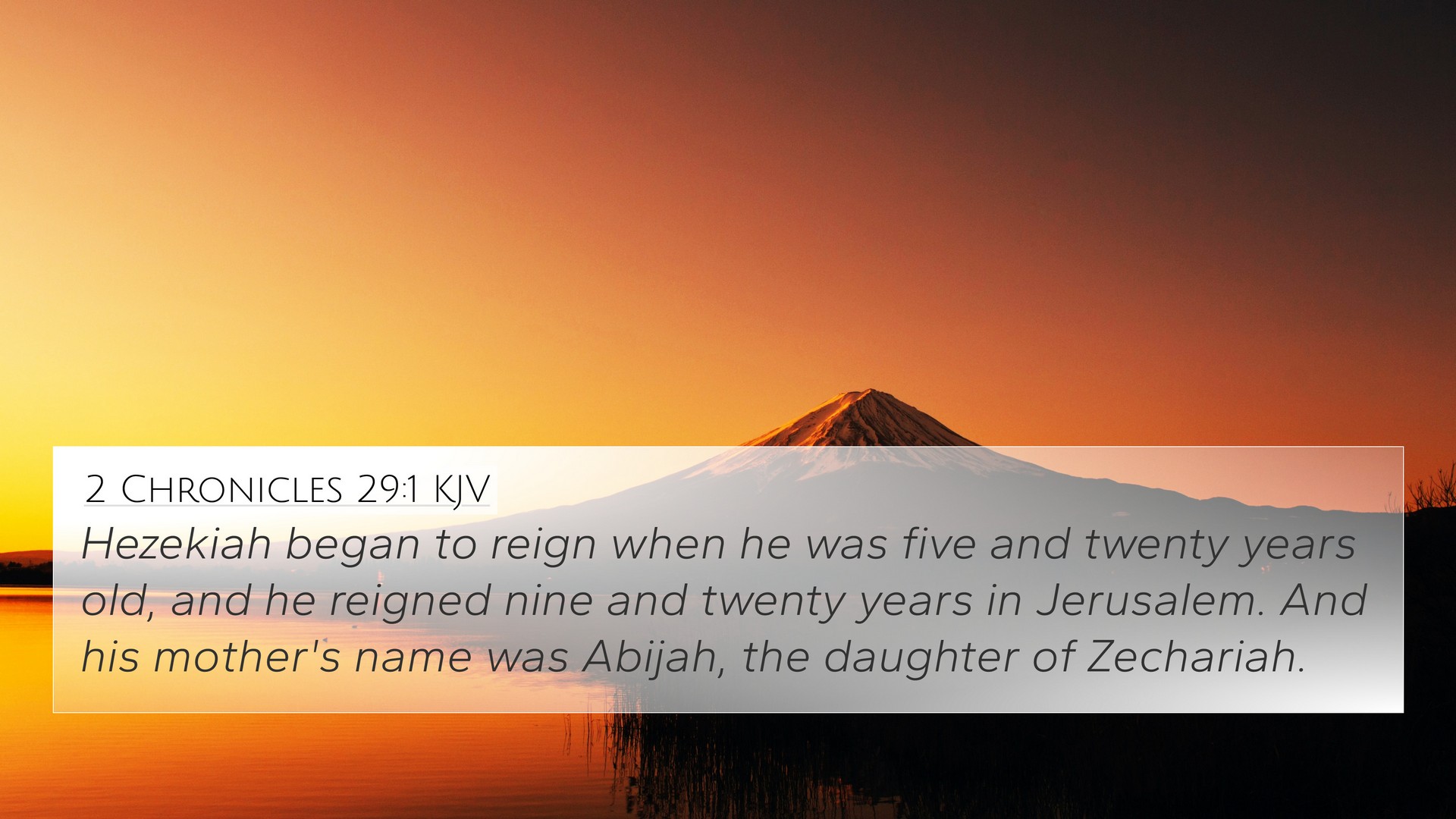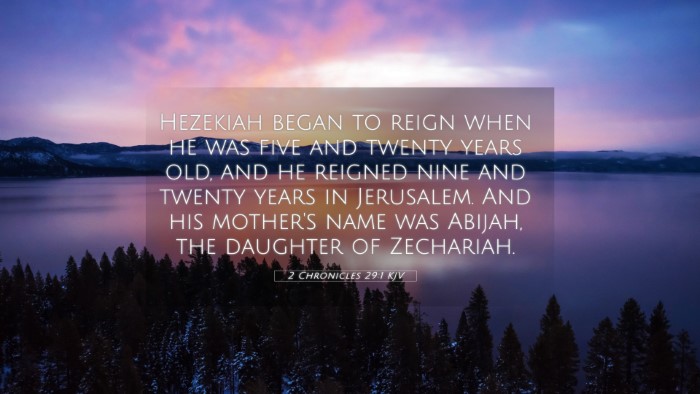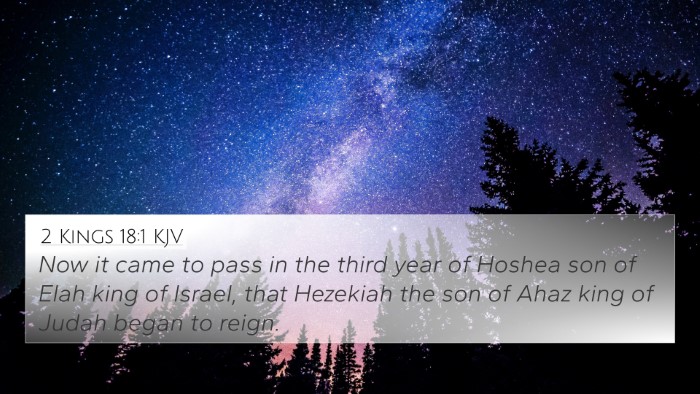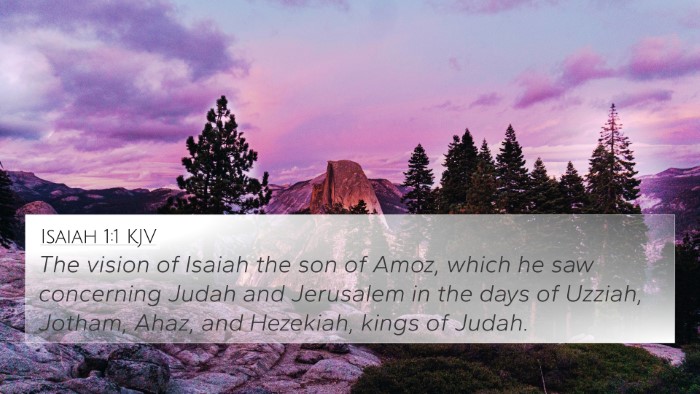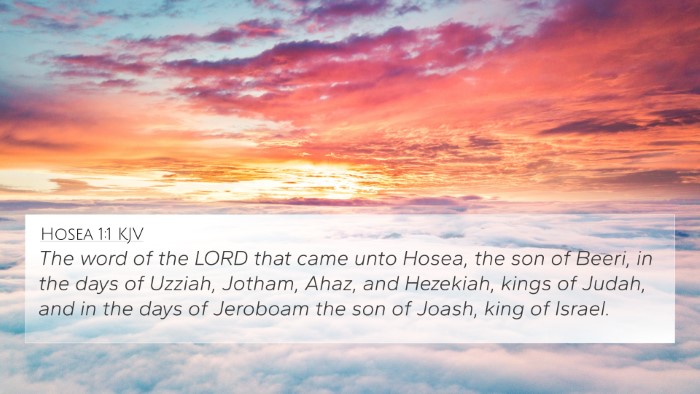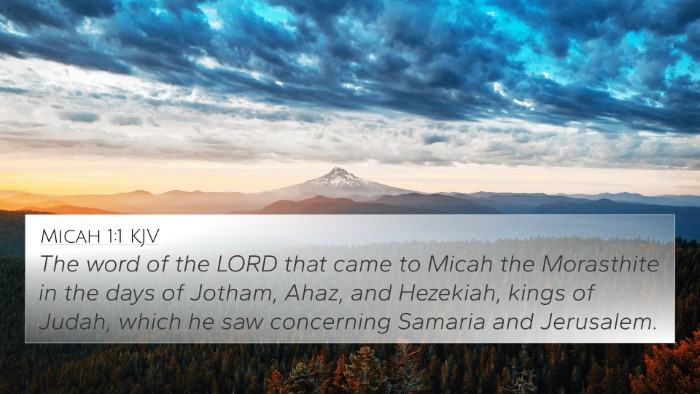Understanding 2 Chronicles 29:1
Verse: 2 Chronicles 29:1 - "Hezekiah began to reign when he was five and twenty years old, and he reigned nine and twenty years in Jerusalem. And his mother's name was Abijah, the daughter of Zachariah."
Summary of Meaning
2 Chronicles 29:1 introduces King Hezekiah, outlining his age at the start of his reign and his mother's lineage. This verse sets the stage for the significant reforms and religious revival he would initiate in Judah.
Commentary Insights
This verse has been analyzed by various public domain commentaries which provide layers of understanding:
- Matthew Henry's Commentary: Highlights the importance of Hezekiah's age and the heritage from which he comes. As a young ruler, Hezekiah demonstrates that leadership effectiveness can arise from even younger generations. His mother's identity implies a noble line, suggesting that good influence can come from one’s lineage.
- Albert Barnes' Notes: Points out that Hezekiah's reign embodies both his youth and the potential for reform. His mother’s name, Abijah, is significant as it indicates a connection to the priestly line, offering the premise that his reign is likely to lead to religious adherence and transformation.
- Adam Clarke's Commentary: Notes the impact of Hezekiah's leadership style. The mention of his mother's name adds depth, emphasizing the combinatory effect of royal and priestly lineages, which would be vital for spiritual reforms in the kingdom.
Contextual Importance
The verse places Hezekiah at a pivotal moment in Jewish history. Following years of idolatry and neglect of the temple, Hezekiah’s reign marked a return to the worship of Yahweh. This sets a foundation for understanding the themes of restoration and covenant faithfulness that permeate the following chapters.
Bible Cross References
This verse relates to several key passages throughout the Bible that enhance our understanding of Hezekiah’s significance and the themes of leadership, reform, and faithfulness:
- 2 Kings 18:1-3: Corresponds with the accounts of Hezekiah's reign and highlights his reforms.
- Isaiah 36-39: Chronicles events during Hezekiah’s reign, revealing his relationship with God and his challenges.
- 2 Chronicles 30: Discusses the Passover celebration he reinstated, showcasing his priority on God-centered worship.
- Isaiah 38:1-5: Covers Hezekiah's illness and God’s promise of healing, emphasizing his righteous standing before God.
- 2 Chronicles 31:20-21: Details his efforts to bring back proper worship and the observance of the Law.
- 2 Kings 20:20: Refers to Hezekiah’s achievements and construction projects that support and reflect his commitment to God.
- Psalms 78:67-72: Reflects on God's choice of David and, by extension, royal lineages such as Hezekiah's.
Thematic Connections
Hezekiah’s reign in 2 Chronicles 29:1 not only embodies a specific historical moment but also thematically connects to numerous biblical ideas:
- Leadership and Governance: Explores the nature of godly leadership as opposed to wicked kings.
- Restoration of Worship: Sets the precedence for future leaders to follow God's commands and restore true worship.
- Faithfulness to God: Highlights the importance of individual commitment to God's covenant.
Tools for Bible Cross-Referencing
To deepen the understanding of Biblical texts and their interconnections, consider utilizing various resources:
- Bible Concordance: A reference tool to find words and their associated verses.
- Bible Cross-Reference Guide: A systematic approach to correlate related scriptures.
- Bible Reference Resources: Various tools that assist in linking verses and themes.
How to Use Bible Cross-References
Utilize the following methods for effective Bible study:
- Identifying Connections: Explore how different verses relate to common themes.
- Comparative Analysis: Examine parallels between the Old and New Testament for deeper insights.
- Bible Chain References: Establish a pathway of related verses for comprehensive understanding.
Conclusion
2 Chronicles 29:1 serves as a critical juncture in the narrative of Judah, exemplifying themes of restored leadership under Hezekiah. As believers examine this verse and its accompanying insights, they gain a richer understanding of the theological and historical contexts, which can enhance their spiritual journey.
